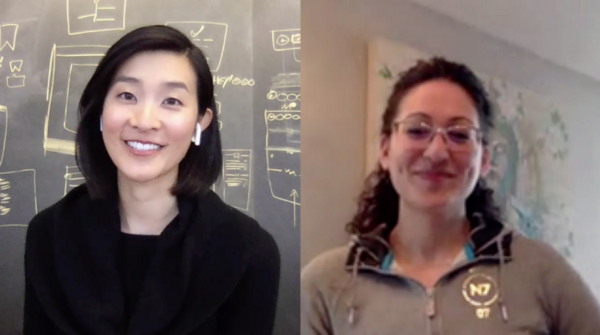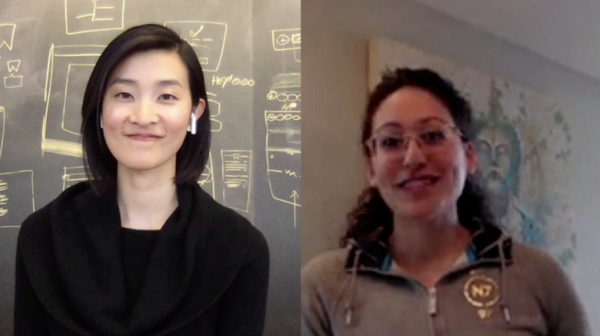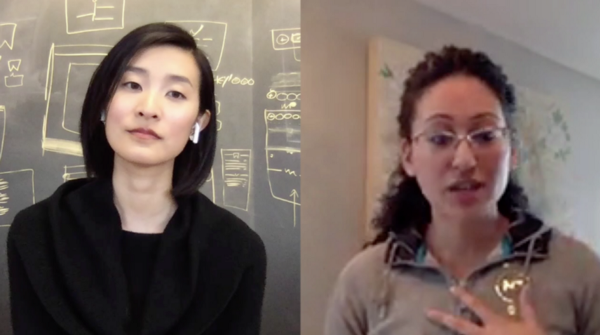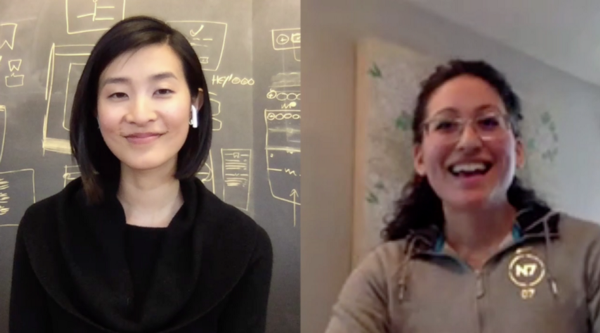With a focus on diversity and inclusion, the CEO of a Chicago-based media company focused keeps it real about the myths and struggles of leadership.
Claire: Hi everyone, I’m Claire Lew and I’m the CEO of Know Your Company and it is my honor today to introduce a very good friend of mine who is on the heartbeat, the one and only Elena Valentine. She is the CEO and founder of Skill Scout, and she’s actually based here in Chicago but we couldn’t get together in person unfortunately, but her company is amazing if you don’t already know about it. They’re on a mission to bring storytelling into the workplace and have just worked with some amazing brands and companies as this media company to help folks better recruit for the jobs that they have.
And so, the other reason for why I love Elena other than just being this badass CEO is that she is incredibly intentional about creating a more diverse and inclusive workforce, first and foremost starting with Skill Scout. They have primarily hired women and people of color and the way she looks at it is, if you care about diversity you’ve got to walk the walk and so her company in many ways is a shining example of that.
Just so excited to have you here today Elena.
Elena: Yes woo hoo!

Claire: So Elena as you may know, I’ve been asking this one question to all sorts of leaders over the past few months, and it is … You ready? It is: What’s something you wish you would have learned earlier as a leader? It can also be more than one thing, if you want.
Elena: Yeah this is hilarious but literally I have been thinking about this, it’s your receivables.
Claire: Oh.
Elena: You don’t realize that when it comes to your cash flow, you have to keep really good track of your receivables to make sure you don’t lose money. So that was certainly a big thing and one that we constantly go through even now to make sure that we can continue to do what we do, which I think, then gets me to the other one, which is the not so glamorous side of being an entrepreneur and leader.
That it’s about staying alive like a cockroach. And that’s not glamorous and sexy whatsoever. But I think it’s really all about, especially in the beginning, it’s being able to survive another day and doing whatever, by any means possible to make that happen and sometimes that means that your business plans look really messy and it doesn’t necessarily fit with the original intention.
And it’s being okay with the fact that things will not go as planned and that, at the end of the day, it’s about continuing to move forward to survive, to build your business.
Claire: This is why I love you Elena. Keeping it real because I think there is this grand illusion around running your own company that oh, it’s growth, you’re killing it and I’m not saying that you’re not but you’re bringing us back down to reality of building a business though is in many ways just about making it to the next day. It’s about making sure you are making more money than you spend. It is about making sure you have enough receivables and in some mythology that we’ve created, whether it’s the media, whether it’s all these ridiculous articles and books that we read around entrepreneurship or leadership, that gets lost.
Claire: Do you feel like before you became an entrepreneur and before you started your own company, you had bought into myth or did you know going into this journey as a leader that, all right, this is about surviving, this is gonna be part of the struggle? Were you aware?

Elena: Yes and no. I’ll be honest. And this is so hilarious and naïve of me to think this way but when I got into this, I kinda came in thinking that there was only one way to build a business and that was to raise a lot of money and grow it to a point that you sow or you IPO, which is so stupid and naïve to think considering that the majority of businesses in the world are boot strapped.
Claire: Yep.
Elena: And are small businesses.
Claire: Yep.
Elena: And are privately owned. But I think that was probably the most naïve thing was I only really saw, kind of, one facet to building a business. I think for a long time I compared and contrasted what I saw out there to what our experience should be.
It took a really long time to realize that I was comparing myself to elephants when I was really a giraffe and I needed to find other dope giraffes. And that took me probably up until the end of last year to really follow my true north and see that I’m a giraffe, I’m proud to be a giraffe and there are businesses that are incredible, that are run by giraffes.
Claire: Absolutely. There are so many dope giraffes and I love that you’ve embraced the fact that you are a giraffe but here’s the thing Elena, I really want to dig into this because I think you have hit on something that so many leaders struggle with, which is our desire to fulfill some sort of story arc that sometimes isn’t even our own. Like you said, you used to only see one potential path to being a successful leader and running a successful business. And I think as leaders, we often think, oh yeah, there is only one type of successful leader and it looks like Steve Jobs or it looks like Elon Musk, or whoever that person in our minds is.
Claire: For you, speaking to other managers and leaders and CEO’s who are watching this, what would you recommend to leaders who struggle with trying to fulfill that story or sort of please other people in that way? What’s your advice? How have you copped with it? Especially at the end of last year like you said, you sort of came into your own on this..
Elena: It’s not gonna make your payroll in two weeks.
Claire: Yeah.
Elena: Yeah. Honestly. It’s not gonna make your payroll in two weeks. And I think that’s what ended up coming down to it was I have to follow the path and I have to find leaders, kind of, building a similar business or type of business, really again, focused on kind of making it to that next month, those next two years. I think inevitably I am here to build a business to last, not to sell and once I realized and kind of knew that, that was my true north, it was circumventing everything else. Then I knew that there was a different story and that there were different leaders that I could aspire to be who were thriving, who were extremely successful in doing that.
Claire: Absolutely. Man, I’m taking it all in because it’s really refreshing to hear that clarity. I think a lot of leaders, myself included, have always wrestled with what is my true north?
For example, especially when it comes to leadership style… You read that maybe leaders should be decisive and that leaders should be strong and have all the answers, but if that’s not sort of your style, then how do you know what your true north is? Or here’s the other thing, I work with some CEO’s Elena and they go, “Claire I’ve been reading about all this stuff about being open hearted and listening and really emotionally in touch. I’m just not really like that though as a leader. Do I change my personality?”
So talk to me about how do you find your true north and what advice might you have for leaders who are trying to do that? Should a leader sort of conform to what the books are saying, what they’ve been reading and … I mean, how did you find that truth north for yourself? And your own sort of leadership style?
Elena: Yeah. So truth is, there’s no one right way to be a leader, that’s why there’s thousands of books on it. And thousands of Brené Browns and Simon Sineks of the world, because there’s not one right way to do it. I mean, I think that’s the uniqueness of the human experience is that it’s extremely multi-faceted. So that’s one thing I would say. Now certainly there are narratives that are more popular than others .
But I think when it’s about finding your own true north as a leader, it’s the idea that you are continuously learning and exposing yourself to all different kinds of styles. Even if you inherently know that, that’s not the right one for you, to the very least know that it exists.
Because part of my business is service and building relationships, which means that on the other side of the table, if that’s a client, if that’s a potential employee, I’m dealing with that specific kind of personality.
And I in turn have to understand how I adjust and how I can elevate that relationship regardless if it’s not exactly like my own, so that’s one. But I will say I was very lucky, and I’m sure in many ways like yourself, we’ve all had our mentors and the kind of leaders that we aspire to be and I was super lucky to be professionally raised in the kind of innovation design, design thinking space. So my professional parents are Chris and Cira Conley who are the founders of gravitytank now Salesforce, and they were kind of a main stay innovation design firm here in the city and that’s the main exposure that Abby and I had of leaders, which were leaders who ate last, leaders who were empathetic first. And leaders who saw their biggest role as being servants to their organization and to the people who they worked with.

And so, as a result of that, I was working there and having these visions of the kind of leader I wanted to be. I wanted to be the female version of Chris Conley. And the way that he had taken me under his wing and allowed me to grow and allowed me thrive. It wasn’t a lot of dictation, it was a lot of how would you solve this problem Elena? And giving me the space to fail, and to also present new ways to actually do it. There is a gift to being able to identify strengths of someone and helping them to leverage that.
The other thing I really learned from him inherently as a result, again of being a design researcher, being someone who’s always trying to put themselves in someone else’s shoes, was always that, if someone fails, if one of my colleagues fails, if I failed under Chris Conley, the question always was, what did I do as a leader that set you up for failure? And what can I do as a leader to set you up for success? What barriers do I have to remove for you? What kind of structures of guidance do I need to put in place to make you successful?
And when you do that, when you realize that, you start to open yourself up to actually having a true feedback conversation. So it doesn’t just become around, hey Abby, Nicole, Colette, this is what you did wrong. It’s to say, so I’ve been able to reflect on this, and here’s what I know I did wrong. Here’s my CEO failure bow, of why I know this didn’t look how it should have. And here’s what I’m going do to improve that. And so I open up all of those conversations when it comes to success and failures, of also making sure that I’m opening myself up to reflect on what I could have done better, but also making comfortable for them to let me know what I could have been working on, in addition to their own reflections of what could have gone better in terms of them being able to bring something to the table.
Claire: Absolutely. No, I think you’ve touched so much that’s helpful for folks in terms of making sure … I love what you were saying first of all, of the awareness piece, right. Being aware of how you’re coming across, right? Even it’s not necessarily your style but what effect does that have on the client or the employee you’re working with? I love your mention of mentors and how much that shapes where you draw inspiration from. I think all of us, hopefully, haven’t just had the bad boss experience where we’re like, “Okay we don’t wanna be that.” Hopefully many of us have had the good leader experience and gotten to work with someone who we really admired, I know that’s shaped some of my views as well. And then this last idea of wanting that feedback and being very open and saying, “Okay, here’s where I messed up. Here’s where I just fell flat on my face. Tell me how I can be better,” and how in those ways that can help shape your true north, your personal style of leadership, those three different pieces.
That’s brilliant Elena. I guess for new leaders and managers, we have a lot of folks who watch this who are newly promoted or a leader of a team for the very first time. What would you recommend for them to internalize … I mean, going back to the very first thing you talked about of surviving another day, what would you tell them to sort of internalize that ethos? Or is there anything more tactically or on a day to day basis for them to not get overwhelmed also by the process of feeling like leadership is … Yeah, it can be a grind and it can feel like you’re just trying to survive and just get to the next day.
Elena: I mean, I think it’s a reframe. I mean, obviously not everyday should feel like survival.
Claire: Yeah.

Elena: But I will kind of harken back to another one of my great professional uncles, who we both mutually know, Josh Braun and whether it be a sale or whether it be leveraging your own team, your role as a manager or sales in general, is what can I do to help make you more awesome? And that could be about removing barriers, that could be about putting processes in place but I think that there’s something really poignant about reframing to understand it on a personal level, be it for an external facing problem or an internal problem, what is it as a manger that I could do to help make you more awesome? So that I would say, is kind of … It’s more of a key question and it’s seeing that as a manager these are people and you have to look at them holistically and sometimes it isn’t just a work tactical problem.
There’s something deeper than that and so I think part of it is not being afraid to go there because I think some of the best leaders who can go there can help to understand what are some of other just general and inherent motivations of that employee, to help support them or to know that they can feel comfortable saying, “Hey this is my kind of personal problem that I’m facing.”
And even to have that kind of cathartic experience with that hopefully, and knowing that you’re listening, can dramatically help shift their work day that day, or what they’re looking to accomplish. So I think that definitely reframing the how can I make you more awesome? Thinking about it more holistically. And a very simple question that I’m always asking is, what can I do to make you successful in X?
Can I be doing anything better? And it may not necessarily be personal, it literally will be … They’ll just tell you, yes I’d like to be able to carve from 11 to 11:30 every day to do this. And so, asking that simple question gets you very far.
Claire: That’s amazing Elena, thank you so much. I’m sure folks watching this are writing that question down, keeping it in mind. And in general, thank you so much for sharing all your wisdom on the things you wish you would have learned, on the things that have been helpful to you. This has been so fun.
Elena: Yes! Thank you Miss Claire Lew.
Claire: All right. See ya, thanks Elena.
